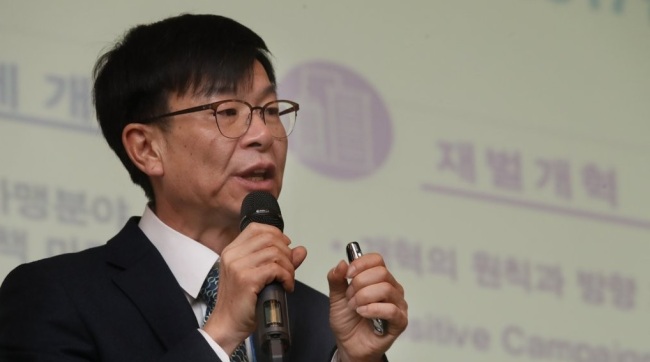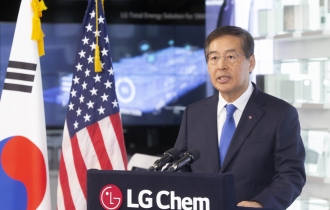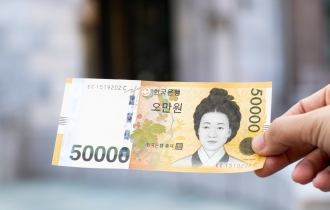FTC can’t be a silver bullet, says ‘Chaebol Sniper’
[THE INVESTOR] Korea’s resident “Chaebol Sniper” was at times outspoken, at times pensive.
But he was always eloquent and polite, and on the whole never lost track of his train of thoughts, nor did he back down from his stance on how to deal with family-controlled conglomerates when he held a two-hour breakfast meeting with mostly lawyers and former FTC officials on Feb. 23.

FTC Chairman Kim Sang-jo.
To be fair, most of what Fair Trade Commission chief Kim Sang-jo -- aka Chaebol Sniper -- said was repetitive. He is big on revising the fair trade law system altogether, along with it local commerce laws which the former professor views as both outdated and “unjust.”
“The playground itself is unfair, not level. Without a complete overhaul, simply tweaking some of the laws won’t be effective, not to mention, it can’t even happen given the current state of parliament,” Kim said.
He also touched on a pain point that nobody has been able to resolve over the past three decades or so; why governments insist on fragmented policies that are rarely consistent or persistent.
“Building such a legal infrastructure needs to go beyond politics and government,” he said. “It has to be phased in, it has to be consistent, and most of all, it has to be predictable.”
Kim conceded that most governments had their jobs cut out for them, since the economy was either in full crisis mode or in a recession immediately after their terms began. This makes it difficult for administrations to lay down the law.
“I even told President Moon Jae-in that he’s in luck, for he’s in a position where he doesn’t have to worry too much about the economy.”
Soft laws are another prerequisite for setting things straight, according to Kim who believes it’s not just the hard laws, but a social atmosphere, coupled with various tools with which individuals and companies can attempt to get justice, which is necessary to create the right business environment.
“Fair trade can’t be established with administrative measures only. It’s not effective. All related organizations including the judicial organizations need to come together to effectively abolish bad practices,” he said.
Kim also seemed to be conscious of his reputation preceding him, saying that neither he nor the FTC can be a silver bullet.
“Every day at Sejong, I see people demonstrating, people asking me to wipe the tears of the downtrodden, society’s weakest links, but in the end, the FTC cannot act alone,” he said.
Regarding the criticism the watchdog has faced for years for alleged slap-on-the-wrist penalties on law-violating conglomerates, Kim stressed that the FTC supports the idea of eliminating exclusive rights to refer cases to the prosecution.
This was in line with an announcement the watchdog made on Feb.22, saying it would relinquish rights in some areas, such as collusion.
Stripping the FTC of exclusive referral rights had been an election pledge of President Moon.
One other topic both Kim and the audience dwelled on quite extensively was the lobbyist regulations that Kim put in place early this year. All FTC officials must now report when they meet anyone who is in their jurisdiction. This caused a stir, and some officials had complained that this has led to a halt in communication with the market participants.
Kim explained that “it takes only two minutes” to write up reports, and that he only wants FTC officials to exercise awareness.
“It’s not meant to be a harness to trap people. It’s meant to be preventative, to make sure people are conscious of who they are meeting and why,” he added.
By Jemmie Kim (jemmie@heraldcorp.com)
EDITOR'S PICKS
- LG Chem eyes new leap into top science company
- Korea enters clear growth path as Q1 growth hits 2-year high
- Hyundai, Kia seek to boost presence in China market
- 7 out of 10 wealthy Koreans offer grim outlook for 2024
- [KH Explains] Korean shipbuilding stocks rally: Real growth or bubble?
- [Hello India] Hyundai Motor vows to boost 'clean mobility' in India
- Eximbank to nurture regional development specialists
- [From the Scene] KG Mobility poised to take next leap










![[KH Explains] Korean shipbuilding stocks rally: Real growth or bubble?](http://res.heraldm.com/phpwas/restmb_idxmake.php?idx=141&simg=/content/image/2024/04/25/20240425050656_0.jpg)
![[Hello India] Hyundai Motor vows to boost 'clean mobility' in India](http://res.heraldm.com/phpwas/restmb_idxmake.php?idx=141&simg=/content/image/2024/04/25/20240425050672_0.jpg)

![[From the Scene] KG Mobility poised to take next leap](http://res.heraldm.com/phpwas/restmb_idxmake.php?idx=141&simg=/content/image/2024/04/24/20240424050621_0.jpg)

